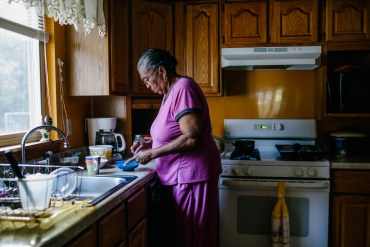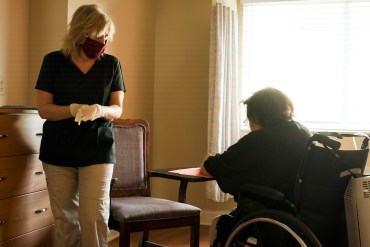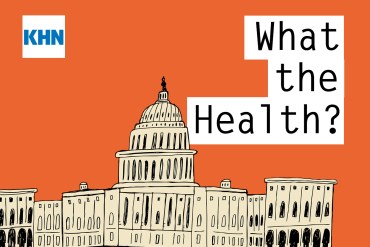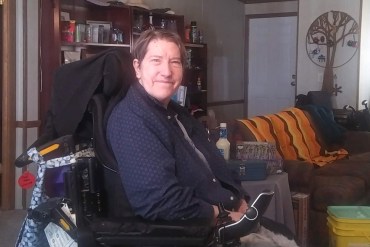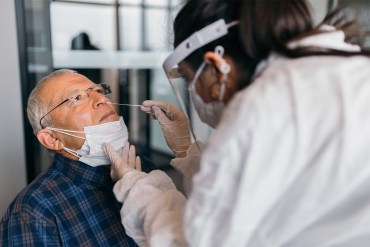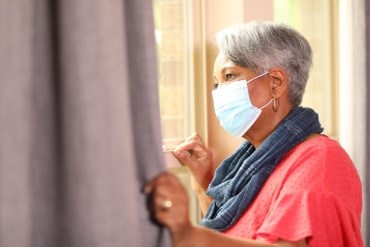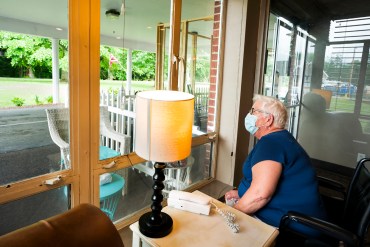Medicare Advantage Plans Send Pals to Seniors’ Homes for Companionship — And Profits
Many Medicare Advantage plans send caregivers to the homes of seniors periodically to help with housework and provide companionship. But the workers may also prod seniors into activities that boost the plans’ Medicare ratings and federal reimbursements.
Despite Seniors’ Strong Desire to Age in Place, the Village Model Remains a Boutique Option
Membership-based villages help arrange services for seniors — such as handyman help or transportation to appointments — and provide social connections through classes, leisure opportunities, or community events. Despite great promise, they have been slow to expand because of difficulties raising funding and keeping people interested.
Patients Divided Over Alzheimer’s Drug: Is It a ‘Risk I’m Willing to Take’ or Just a ‘Magic Pill’?
Medicare has proposed limiting coverage of Aduhelm, the costly new drug to treat Alzheimer’s disease, and several prominent groups representing patients and their families are pressing the program to make it more widely available. But among individuals facing the disease, the outlook is more nuanced.
Seeking to Shift Costs to Medicare, More Employers Move Retirees to Advantage Plans
Private and public employers are increasingly using the government’s Medicare Advantage program as an alternative to their existing retiree health plan and traditional Medicare coverage. As a result, the federal government is paying the “overwhelming majority” of medical costs, according to an industry analyst.
Biden Pledges Better Nursing Home Care, but He Likely Won’t Fast-Track It
CMS chief Chiquita Brooks-LaSure says the agency reserves its power to quickly institute new regulations for “absolute emergencies.” On staffing, nursing home residents might need to wait years to see any real change.
Biden’s Promise of Better Nursing Home Care Will Require Many More Workers
The president wants to set minimum staffing levels for the beleaguered nursing home industry. But, given a lack of transparency surrounding the industry’s finances, it’s a mystery how facilities will shoulder the added costs.
Readers and Tweeters Have Mental Health Care on Their Minds
KHN gives readers a chance to comment on a recent batch of stories.
Watch: Seniors Share How They’ve Made It Through the Pandemic
Nine seniors from across the country talk frankly about feeling alone and constrained, missing church, and family routines. They also share newfound hope and discoveries that arose from the crisis.
As Covid Slogs On, Seniors Find Fortitude Waning and Malaise Growing
The spread of the omicron variant has dashed the hopes of many older adults that the country was exiting the worst of the pandemic, leaving them anxious while their patience wears thin.
Inside the Tactical Tug of War Over the Controversial Alzheimer’s Drug
An epic battle is playing out behind the scenes over whether the government should pay for Aduhelm, an FDA-approved Alzheimer’s drug that scientists say has not been proven to work.
KHN’s ‘What the Health?’: FDA Takes Center Stage
Congress is set to start its once-every-five-years review of the law that authorizes user fees to finance the hiring of personnel to speed the FDA review of drugs. The periodic renewals of “PDUFA” also give lawmakers a chance to make other changes to the agency at the hub of the pandemic. Meanwhile, the FDA could also find itself at the center of the abortion debate and a controversial new medication to treat Alzheimer’s disease. Anna Edney of Bloomberg News, Joanne Kenen of the Johns Hopkins Bloomberg School of Public Health and Politico, and Sarah Karlin-Smith of the Pink Sheet join KHN’s Julie Rovner to discuss these issues and more.
Pandemic-Fueled Shortages of Home Health Workers Strand Patients Without Necessary Care
Home health and hospice agencies are experiencing extreme worker shortages, which means they can’t provide services to all the patients seeking care.
At Nursing Homes, Long Waits for Results Render Covid Tests ‘Useless’
As omicron surges, more nursing homes are facing a double whammy: Lab tests are taking too long, and fast antigen tests are in short supply.
In California Nursing Homes, Omicron Is Bad, but So Is the Isolation
Omicron infections are surging in residential care facilities, causing massive sickouts among staff members and an uptick in hospitalizations and deaths. The latest visitor restrictions and testing requirements are also compounding the isolation that residents have suffered for almost two years.
Medicare Patients Win the Right to Appeal Gap in Nursing Home Coverage
If federal officials accept a court’s decision, some patients will get a chance to seek refunds for their nursing home and other expenses.
Readers and Tweeters: Give Nurse Practitioners Their Due
KHN gives readers a chance to comment on a recent batch of stories.
¿Por qué Medicare no paga por las pruebas caseras para covid?
Las mismas leyes del programa para los adultos mayores previenen que puedan comprar medicamentos de venta libre y obtener este tipo de pruebas sin una orden médica.
Why Medicare Doesn’t Pay for Rapid At-Home Covid Tests
The laws governing Medicare don’t provide coverage for self-administered diagnostic tests, which is precisely what the rapid antigen tests are and why they are an important tool for containing the pandemic.
Families Complain as States Require Covid Testing for Nursing Home Visits
Relatives say it is important they be allowed to go into nursing homes because staff shortages are affecting care. And many are still upset about lengthy separations from loved ones during lockdowns earlier in the pandemic.
Muchos familiares dicen que no pueden conseguir las pruebas ante la enorme demanda y la escasez de suministros, lo que les impide ver a sus seres queridos.




